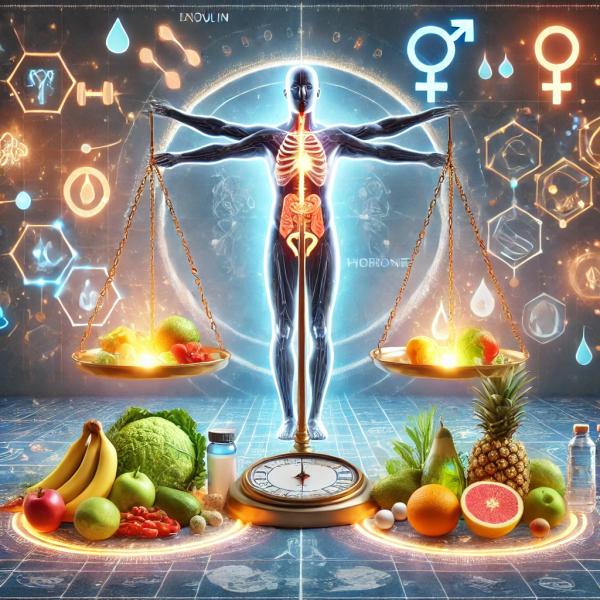
According to the Cleveland Clinic:
“A hormonal imbalance happens when you have too much or too little of one or more hormones--your body's chemical messengers. It's a broad term that can represent many different hormone-related conditions.”
Since the phrase “hormone imbalance” is so broad, it may be associated with any number of conditions. Some conditions are specific to women, such as polycystic ovary syndrome and amenorrhea; other conditions can occur in everyone, such as acne, diabetes, infertility, and hypo and hyperthyroidism.
Hormone imbalance is associated with myriad symptoms, some of which are very specific (e.g., no period), while others are quite vague (e.g., fatigue and unexplained weight gain). Hormonal imbalances are not uncommon, especially for women, during almost any phase of our lives. Because a hormonal imbalance can directly contribute to and cause serious health conditions, it is important that if you suspect a hormonal imbalance, consult with a physician specializing in hormonal disease–an endocrinologist.
The package of hormonal imbalances largely associated with women's health, a plethora of vague symptoms to choose from, and the phrase itself being broad has created catnip for wellness grifters.
Hormonal Wellness
In honor of the January Health Habits trend, I thought I would address a listicle published by chiropractor Josh Axe in December 2024 advertising 20 “natural” ways to balance your hormones. It consists of both generic and weirdly specific advice, redundancies, and sales pitches, following a tried and true formula:
- Drop a jargon-y phrase for a health problem that the vast majority of people do not have but can fear.
- Science-wash it with plenty of generic health advice, wellness words, fantastical claims, and flimsy evidence.
- Tout products for said health problem that you coincidentally sell.
Redundancies
Developing a good, substantive listicle where every point is important is difficult. Most listicles aim to be somewhere between five and ten items because our attention span isn't very long, and for most topics, five to ten points are more than sufficient for a broad audience. However, Dr. Axe has gone above and beyond and named 20 recommendations for balancing your hormones. Unsurprisingly, many of the items are quite redundant. For example:

He could've easily stayed in the five to ten range but opted for overachiever status. It doesn't quite work.
Both Generic and Weirdly Specific Advice
Like most listicles, this one is an odd blend of the unbelievably generic and suspiciously specific. We have “Stop smoking, get more sleep, eat more fiber, and exercise” juxtaposed with “Follow the Mediterranean diet and use these seven types of supplements.” The generic advice is fine, but it's boring, which is one reason why it's mixed in with specifics. Most people know that they should be trying to get enough sleep. At this point, everyone knows that smoking is bad for you. It's not sexy to tell people to “manage your stress” and “get more exercise.” That advice is not what attracts eyeballs and earns the coveted click. The specific advice does.
Diet is the predominant theme in the listicle. Of the 20 pieces of advice, arguably 11 of them concern diet. From the general “consume enough fiber, lower sugar intake, and eat more protein” to the extremely specific “follow the Mediterranean diet, swap carbs for fats, and add fatty fish to your diet.” Given that over half of the items relate to diet, you would figure that would adequately cover nutrition. However, to ensure that all your nutritional bases really are covered, there is item #2, “Supplement to fill nutritional voids.”
Sales Pitch
The not-so-hidden portion of this article that is the most important for Axe's bottom line are the items that warranted the most space, specifically step #2, “Supplement to fill nutritional voids.” He dedicates the most virtual space here. While the listicle starts with multiple paragraphs of advice per step, we have barely a few sentences by the time we hit the seventh item. Those are the generic pieces of advice.
The longest item on the list, by far, is the supplement item. It specifically recommends seven supplements, all of which can be found in his store. There's Primrose Oil, which, when you search for it in Axe’s store, suggests a product called “Women's Hormone Balance,” which is $30 per bottle. But wait, there’s more:
- Vitamin D is available for $30 per bottle, plus many other Vitamin D-containing product options.
- Plenty of Bone Broth options spanning from $45 to almost $200.
- Probiotics options are similar regarding the number of products and price points.
- Mushrooms starting at $30 per bottle.
- Adaptogens and “herbal hormonal supplements.”
It's no accident that he spills the most digital ink in this section and sells at least one product (usually multiple) that fulfills this recommendation. He’s used this exact formula before. In 2024, I wrote about a multi-step liver detox that he suggests, where he recommends several supplements, all sold in his store.
While I've used Dr. Axe as an example, he is far from the only offender in this space. I opted not to cover a diet this year because my feeds were overwhelmed with advertisements about balancing my hormones and plenty of influencers to help me do it. Make no mistake: money is the goal. Your health is not. Make 2025 the year of hormonal health: if you have concerns, see an endocrinologist, not an influencer (or chiropractor).



